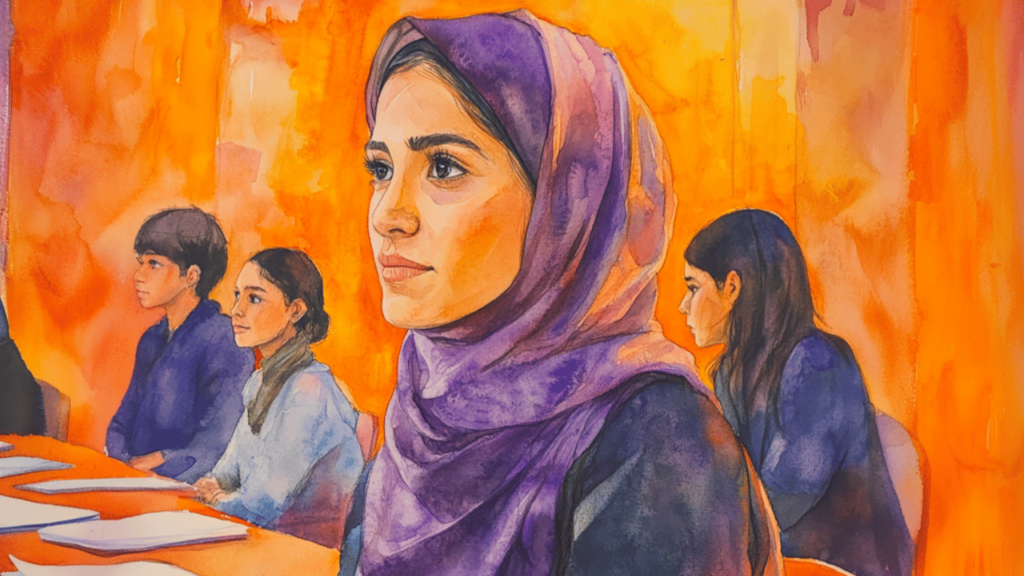Sarah wishes to undertake professional training at a training organization. Her application was accepted, but when she arrives at the reception, she is approached by the director who informs her that she cannot join the training while wearing a headscarf. The director cites the internal regulations which include the following statement: ‘in application of the principle of secularism, the wearing of any ostentatious sign of religious affiliation is strictly forbidden, regardless of the training location’.
A training center is an organization approved by the State (DREETS) and competent to provide professional training, either initial or continuing.
Training centers are characterized by a variety of situations in terms of the public they serve and the managing organizations.
They can be public or private. They can be run by Consular Chambers, the Chamber of Commerce and Industry, the Chamber of Trades and Crafts, but also by the National Education system, various public institutions, or even large companies, etc.
This may include training provided by a GRETA or a CFA.
What does the law say?
Religious freedom is a principle enshrined in law and any form of discrimination is prohibited, particularly discrimination based on real or perceived religious affiliation.
- Thus, the European Directive 2000/78 EC of the Council of November 27, 2000, establishing a general framework for equal treatment in employment and occupation, prohibits discrimination based on religion, including by public bodies, in access to all types and levels of vocational training.
- The provisions of Directive 2000/78 were transposed into French law in Law No. 2008-496 of May 27, 2008 on various provisions for adaptation to Community law in the field of anti-discrimination. Article 2-2 of this law states that:
“ Any direct or indirect discrimination based on (…) religion or beliefs, (…) is prohibited in matters of (…) vocational training and work (…).
This principle does not preclude differences in treatment based on the grounds referred to in the preceding paragraph when they correspond to an essential and determining occupational requirement and provided that the objective is legitimate and the requirement is proportionate;
- Furthermore, the Penal Code (Art. 225-1 and 225-2) prohibits discrimination when it consists of refusing to provide a good or service, or making the provision of a good or service conditional on a condition based particularly on belonging or not belonging, real or supposed, to a religion.
- The concept of provision of goods or services is broad and covers all economic activities, including access to paid vocational training (Deliberation of Halde No. 2009-402 of 14.12.09).
- Consequently, a training center prohibiting the wearing of a headscarf characterizes religious discrimination regarding the provision of a service within the meaning of Articles 225-1 and 225-2 of the Penal Code, Articles 2-2 and 2-3 of Law No. 2008-496 of May 27, 2008, as amended, on various provisions for adaptation to Community law in the field of anti-discrimination (Decision of the Defender of Rights No. 2018-013).
- In case of an internship in a company as part of your training, you can consult the company internship information sheet.
What should I do?
If you are denied access to vocational training due to wearing a religious symbol:
- Demand a written and justified notification of the refusal you are facing.
- Consult the internal regulations of the training center to become aware of any illegal provisions.
- If no provision in the regulations mentions a ban on wearing religious symbols, this is discrimination that should be reported.
- The internal regulations of a training center that would prohibit the wearing of religious symbols is discriminatory and should be reported as such in order to be modified by the administration.
- If the prohibition is not related to specific circumstances linked to compliance with hygiene, safety, or public order rules, you can present to the management of the training center the deliberations of HALDE or the Defender of Rights, which have had the opportunity to rule on similar cases.
- In case of persistent refusal from the management of the training center, file an appeal with them and refer the matter to the Defender of Rights.
- Contact Equitas, which will provide legal assistance and support you in your various procedures.
APPLICABLE REFERENCES:
Articles, laws, circulars, directives: Article L. 141-5-1 of the Education Code resulting from Law No. 2004-228 of March 15, 2004; Ministry of Education circular No. 2004-084 of May 18, 2004; Law No. 2008-496 of May 27, 2008 on various provisions for adaptation to Community law in the field of anti-discrimination (Art. 2-2); Articles 225-1 and 225-2 of the Penal Code; Council Directive 2000/78/EC of November 27, 2000.
Conventions: Art. 10 of the Declaration of the Rights of Man and of the Citizen of 1789; Art. 9 of the Convention for the Protection of Human Rights and Fundamental Freedoms; Articles 18 and 26 of the International Covenant on Civil and Political Rights of 1966.
Case law: CE, November 27, 1996, No. 170209; CJEC February 13, 1985 Gravier v. City of Liège, Case 293/83; TA Paris November 5, 2010, No. 0905232; TA Caen April 5, 2013, No. 1200934; CA Paris, June 8, 2010, No. 08-08286.
Decisions: HALDE Deliberations No. 2009-402 and 2009-403 of December 14, 2009; HALDE Deliberation No. 2011-36 of March 21, 2011; Defender of Rights Decision No. 2018-013; Defender of Rights MLD-2015-216; Defender of Rights No. 2018-126; Defender of Rights No. 2018-287; UN Human Rights Committee, March 14, 2022, CCPR/C/134/D/2921/2016.




